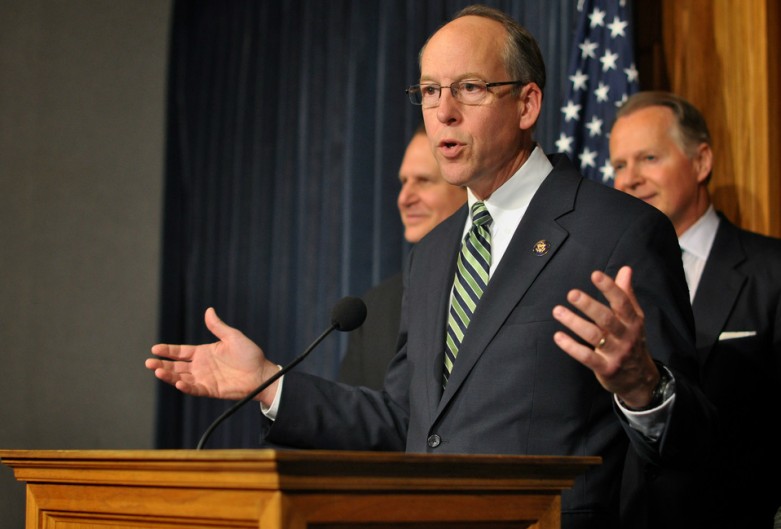
Net Neutrality Rules Face Threats in Congress and the Courts
With a little over a month to go before the FCC’s historic Net Neutrality rules take effect, the cable and phone companies and their lobbyists are working every angle they can think of to destroy the open Internet.
There are multiple efforts simmering in Congress to dismantle, delay or defund the rules that Internet users won just over two months ago. And now the legal battles are heating up.
Here’s a complete rundown of the latest threats:
Congress
Who’s behind this: Rep. Marsha Blackburn
What it does: This bill forbids the FCC from reclassifying broadband service under Title II. The bill has 50 co-sponsors, including many who have gotten campaign money from the same companies trying to kill the open Internet.
Resolution of Disapproval
Who’s behind this: Rep. Doug Collins and (separately) Sen. Rand Paul
What it does: A resolution of disapproval (RoD) is a procedural move Congress can use under the Congressional Review Act to block the FCC’s rules from taking effect. Like the Blackburn bill, it would bar the FCC from reclassifying unless Congress acts to allow it. The House version has 21 co-sponsors, while the companion Senate bill has none.
Who’s behind this: Sen. John Thune and Reps. Fred Upton and Greg Walden (pictured)
What it does: This is the wolf in sheep’s clothing. Thune and Upton introduced a version of this bill in January during the height of the Net Neutrality debate and presented it as “compromise” legislation. But it's riddled with loopholes that would legalize harmful discriminatory practices and strip the FCC of its authority to adopt and enforce rules. Thune and Upton head the commerce committees in their respective chambers and that gives them oversight of the FCC. Under the guise of compromise, they’re trying to convince their Democratic counterparts on those committees to join them in their efforts to dismantle Title II.
Appropriations
What it does: The House and Senate Appropriations Committees set the funding levels for government agencies like the FCC. This often becomes a politicized process and the committees may try to block the FCC from using any of its funding to enforce the Net Neutrality rules. That’s a threat if Congress attaches an appropriations rider to a so-called “must-pass” funding bill during a government-shutdown fight, but it’s hard to know how likely that prospect is.
The Courts
There was just one thing everyone could agree on throughout the Net Neutrality fight: No matter what the FCC did, it would get sued.
Sure enough, the first lawsuits were filed before the rules were even published in the Federal Register, though Net Neutrality supporters were quick to push back.
And once the rules were published, nine additional lawsuits were filed. In all likelihood these will all be combined into one suit, and that could be argued in the D.C. Circuit again (just as the last two Net Neutrality cases were).
And while the ISPs and their trade associations have lined up on one side to challenge the FCC, we’re likely to see a host of companies, public interest groups and organizations jump in to back the FCC in the coming weeks.
But the ISPs aren’t stopping there. Just last week, they tested out another tactic, requesting a delay — or what’s called a “stay” in legal jargon — of the FCC’s implementation of the rules. Some of these requests focus on the FCC’s decision to reclassify broadband as a Title II service but don’t directly attack all of the Net Neutrality rules that prevent blocking, throttling and paid prioritization. But Title II is needed to make those rules work and keep them on solid legal footing. Any attack on Title II is an attempt to undermine the rules.
This strategy to try to look slightly more reasonable is the ISPs’ ploy-du-jour now that Net Neutrality is the law of the land and has the backing of millions of people like you. It’s why open Internet opponents like Sen. John Thune and Rep. Fred Upton are suddenly espousing the great virtues of Net Neutrality and pushing legislation for something they once viewed as a “solution in search of a problem.” But their words are hollow.
The ISPs would love nothing more than to override Title II’s strong framework for nondiscrimination and fashion laws riddled with loopholes for the ISPs to exploit. But they’re going to have a hard time doing it with the American public, Internet businesses large and small, President Obama and many members of Congress in favor of the FCC’s strong Title II-based protections.
And since Title II provides the surest legal foundation for the rules, the cable lobby faces an uphill battle in court, too.
Original photo by Flickr user House GOP